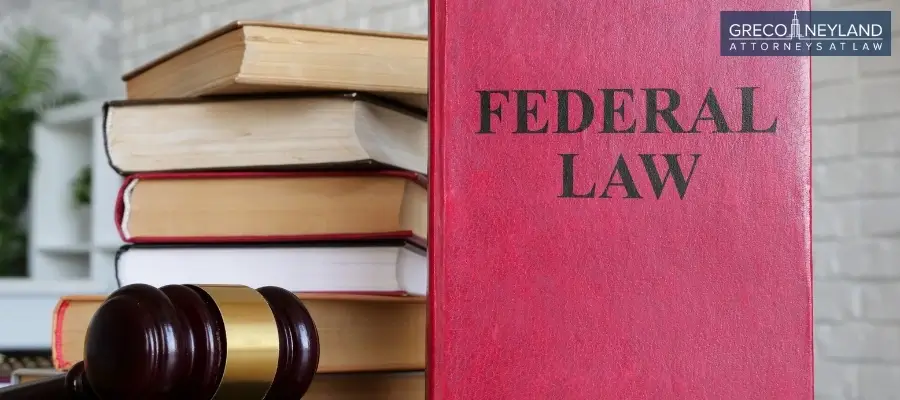|
|
Last Modified on Jan 29, 2026
The federal statute of limitations for most non-capital federal crimes is five years. Capital offenses punishable by death including murder, treason, and espionage have no statute of limitations. Terrorism offenses like aircraft destruction and airport violence have an eight-year limit, while certain financial institution offenses carry a 10-year limit, and theft of major artwork has a 20-year statute of limitations.
When someone is suspected of a crime, there is a timeframe within which the government can bring charges against them. This is called a statute of limitations, and it is an essential legal principle that protects individuals from unfair prosecution. Statutes of limitations exist for civil and criminal cases at the state and federal levels. Federal crimes statute of limitations standards may reflect those of crimes at the state level, though they are not always the same.
Understanding Federal Crimes in Texas
Most criminal offenses taking place in any of Texas’s 254 counties are likely to fall under the jurisdiction of the state government. In certain circumstances, however, these crimes may be prosecuted by the federal government, even if they primarily take place in the Lone Star State.
Federal crimes violate U.S. statutes, and those under federal investigation are often suspected of being involved in illicit activities taking place across state lines, or in large-scale illegal operations, or are believed to have affected the interests of federal institutions through their actions.
Texas has seen several high-profile federal cases over the past few decades. Some notable examples include:
- Enron: The FBI’s Houston Field Office led the investigation in this infamous corporate fraud case, which resulted in the conviction of high-level executives in the company. This case was prosecuted in the Southern District of Texas.
- Operation Wasted Daze: 49 defendants were charged with involvement in a multi-million pill mill scheme, which was investigated by the DEA. This case was tried in the Northern District of Texas.
Texas federal courts see thousands of cases each year. In 2023, for instance, there were 6,422 sentences imposed by the District Court for the Southern District of Texas. Of those, 4,745 sentences were issued for immigration crimes, followed by 894 drug trafficking crimes.
When federal agencies such as the FBI, the DEA, Homeland Security, or the FTA are involved in a criminal investigation, they bring significant investigative resources that can affect even the most reputable company or person in the U.S. For this reason, defendants should understand whether or not the government has the legal authority to prosecute, whether based on the statute of limitations or because the offense may fall under state jurisdiction instead.
Federal Crimes Statute of Limitations
U.S. law sets the statute of limitations for federal crimes. The statute of limitations is a guideline for the allowable or maximum time after a criminal action takes place within which a legal case can be initiated.
Statutes of limitations allow prosecutors sufficient time to investigate a case before bringing charges while also providing protection to individuals from unfair prosecution. Once the statute of limitations expires for a particular crime, the alleged offender can no longer be prosecuted for that offense.
For most non-capital federal crimes, the statute of limitations is five (5) years per 18 U.S.C. § 3282. This means that the federal government must bring charges against the defendant no later than five years after the commission of a crime.
There are exceptions to the standard five-year statute of limitations. Some crimes are subject to extended time limits, while others have no statute of limitations at all.
- Capital Offenses: For crimes that are “punishable by death,” there is no statute of limitations. These include murder, treason, and espionage.
- Certain Terrorism Offenses: The statute of limitations for non-capital offenses under the category of terrorism, such as aircraft destruction, airport violence, or hostage-taking, is eight (8) years.
- Financial Institution Offenses: Certain financial institution offenses violating specific U.S. statutes are subject to a 10-year statute of limitations. These include receiving commissions or gifts in exchange for a loan or using a fictitious name or address in a financial institution.
- Theft of Major Artwork: A 20-year statute of limitations applies to violations of this law, 18 U.S. Code § 668.
Having knowledge of statutes of limitations for federal crimes can give a person subject to investigation an advantage, allowing them to build a robust defense against potential charges if they believe they are outside of these statutes. Working with an federal criminal defense attorney who has a deep understanding of federal crimes is essential to exploring this and other key defense strategies in a federal case.
FAQs
What Is the Statute of Limitations for a Federal Crime?
For most non-capital federal crimes, such as drug trafficking, the statute of limitations is five years. Some exceptions include certain terrorism offenses, such as committing violence at the airport or destroying an aircraft, which are subject to an eight-year statute of limitations.
Providing a fictitious name or address to a financial institution is a crime that can be prosecuted within 10 years. For capital offenses, including murder, there is no statute of limitations.
What Crimes in the U.S. Have No Statute of Limitations?
Crimes in the U.S. that do not have a statute of limitations are capital crimes. Capital crimes include murder, genocide, treason, espionage, and specific drug kingpin offenses. These types of crimes can be prosecuted years or decades after they occur, and a conviction may result in the death penalty. There are an estimated 2,100 federal convicts on death row.
How Far Can the Feds Go Back in Your Criminal History?
How far the federal government can go back in criminal history is not necessarily related to the statutes of limitations. A federal judge may allow evidence of a past crime to be introduced in a trial. A previous conviction may also be used to determine appropriate sentencing (i.e., whether the current offense is a first-time offense or not). A statute of limitations applies from the last criminal act, even in cases that involve a pattern of criminal behavior.
What Is the Statute of Limitations for Financial Crimes?
The statute of limitations for financial crimes varies, depending on the specific crime. Wire fraud is subject to a five-year statute of limitations. A person providing a false name or address to a financial institution may be charged within 10 years of the crime. As our financial systems continue to evolve, thanks to digital currencies and AI becoming more prevalent, we may see changes to the statute of limitations for financial crimes in the future.
Knowing the Federal Crimes Statute of Limitations Is Key to an Effective Defense Strategy
Understanding which statute of limitations applies to which federal crime is a critical piece of information that can make a significant difference in a case. If an offense took place outside the statute of limitations, the federal government has limited ability to bring charges against an individual.
At Greco Neyland, PC, our federal criminal defense attorneys have in-depth knowledge of federal law, including the statute of limitations that apply to different crimes. We work strategically to help clients facing federal charges explore every legal avenue available to achieve the most optimal outcome. Schedule a free consultation today to learn more about our services.





